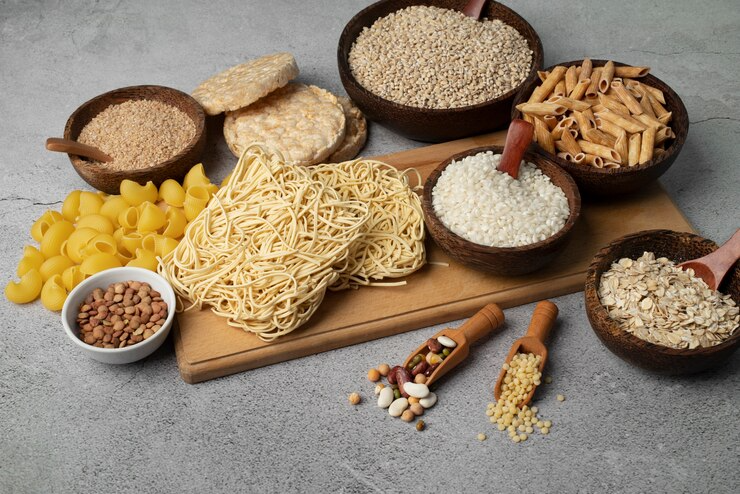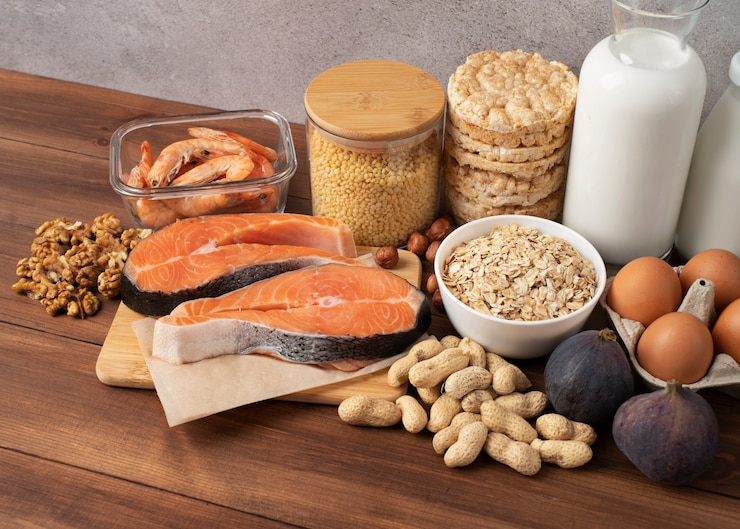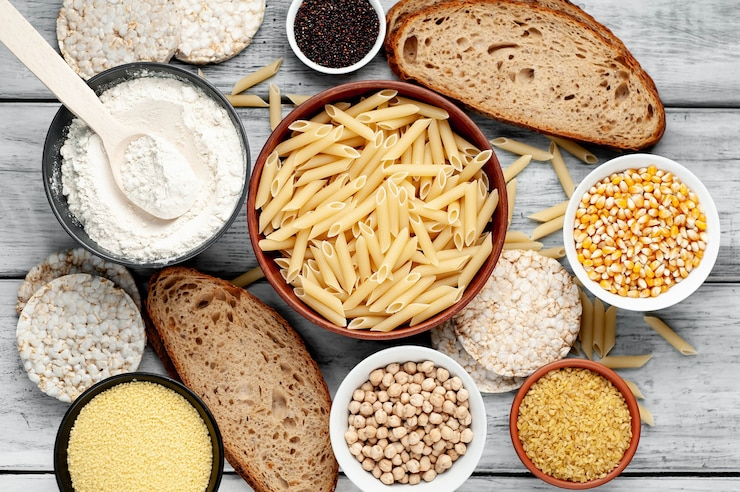Diets rich in omega-3 fatty acids, protein, and specific antioxidants can be proven as the best fat burners.
Beverages like coffee also have properties that boost metabolism.
An increased metabolic rate can contribute to weight loss by burning more calories.
Fat burners tips
1. Focus on eating soluble fibers
Soluble fiber can be your friend when feeling full and potentially managing weight. This type of fiber absorbs water, forming a gel that slows digestion and keeps you satisfied for longer, potentially leading to reduced calorie intake.
Studies suggest it helps reduce belly fat accumulation. Make sure to include fruits, vegetables, legumes, oats, and barley in your diet, as they are excellent sources of soluble fiber.

2. Avoid trans fats foods
Be wary of trans fats! These processed fats, often found through the hydrogenation of soybean and other oils, have been linked to various health concerns, including inflammation, heart disease, and abdominal fat gain.
While their presence in processed foods has decreased, reading labels carefully is still crucial. Avoid products containing “partially hydrogenated fats” to minimize your intake of trans fats and potentially aid in belly fat management.

3. Lessen alcohol consumption
While moderate alcohol consumption might offer some health benefits, excessive intake can be detrimental, especially for your waistline. Research suggests a strong link between heavy drinking and increased belly fat accumulation.
Cutting back or moderating your alcohol intake can be a significant step towards managing your waist size. You don’t have to go completely teetotal, but limiting your daily consumption and avoiding binge drinking can be highly beneficial. The current Dietary Guidelines recommend two or fewer drinks per day for men and one for women.

4. Consume high-protein food
Incorporating protein into your meals is crucial for weight management. Protein boasts numerous benefits: it increases the feeling of fullness thanks to the release of peptide YY, a hormone promoting satiety and reducing hunger.
Additionally, protein elevates your metabolic rate and helps preserve muscle mass during weight loss. Studies reveal a connection between higher protein intake and lower abdominal fat compared to low-protein diets. Aim to include a good protein source, like meat, fish, eggs, dairy, whey protein, or beans, in your meals throughout the day.

5. Try to reduce stress
Manage stress to manage your belly fat. Chronic stress triggers the release of cortisol, a hormone that can increase appetite and promote abdominal fat storage. This effect may be even more pronounced for women with existing central adiposity (fat around the middle). Incorporate stress-relieving activities like yoga or meditation into your routine to combat this.

6. Avoid sugary foods
Be mindful of your sugar intake, as excessive consumption is linked to several health concerns like heart disease, diabetes, and fatty liver disease. Research also suggests a correlation between high sugar intake and increased belly fat. Remember, moderation is vital; even natural sugars like honey should be enjoyed in limited amounts.

7. Do cardio exercises
Incorporating aerobic exercise (cardio) into your routine offers a double benefit: improved overall health and calorie burning. Studies suggest it can effectively reduce belly fat, although the optimal intensity (moderate or high) remains debated. Regardless, the frequency and duration of your exercise program matter.
One study found that postmenopausal women who performed 300 minutes of cardio per week lost more fat than those exercising for 150 minutes. It’s important to note that this study didn’t show a significant difference in visceral belly fat, specifically between the two groups.

You should also read this;
8. Reduce consuming refined carbohydrates
Reducing your overall carb intake, significantly refined carbs can dramatically manage belly fat. Research suggests low-carb diets can be effective for individuals struggling with overweight, type 2 diabetes risk, or PCOS. Even moderate adjustments, like replacing refined carbs with unprocessed starchy carbs, can offer benefits.
A study found that individuals with a higher intake of whole grains had a 17% lower risk of excess abdominal fat than those consuming refined grains more frequently.

9. Try weight lifting
While resistance training, also known as weightlifting or strength training, is primarily known for building and maintaining muscle mass, research suggests it contributes to belly fat reduction. Studies involving individuals with pre-existing conditions like prediabetes, type 2 diabetes, and fatty liver disease have shown potential benefits for belly fat loss.
Combining strength training with aerobic exercise appears even more effective, as demonstrated by a study involving teenagers who are overweight, where this combination resulted in the most significant decrease in visceral fat. If you’re considering incorporating weightlifting into your routine, consulting with a doctor and seeking guidance from a certified personal trainer is recommended.

10. Get enough sleep
Remember to underestimate the power of sleep for managing your weight and belly fat. Research suggests insufficient sleep might be linked to increased obesity risk and belly fat gain, especially for specific groups. One study even found that women who slept less than 5 hours per night were more likely to gain weight compared to those getting seven or more hours.
Sleep apnea, a condition where breathing pauses during sleep, has been associated with excess abdominal fat. Aim for at least 7 hours of quality sleep each night, and consult a doctor if you suspect you have a sleep disorder.

11. Eat fish every week
Include fatty fish like salmon, herring, sardines, mackerel, or anchovies in your diet for a weekly dose of health. These fish are packed with high-quality protein and omega-3 fats, which may benefit your overall health and help reduce belly fat. Studies suggest omega-3s might effectively reduce visceral fat, especially in individuals with fatty liver disease.
If you’re vegan, vegetarian, or don’t regularly eat fish, consider plant-based omega-3 supplements derived from algae. Aim for 2-3 servings of fatty fish per week to reap the potential benefits.

12. Limit drinking fruit juice
While fruit juice offers vitamins and minerals, be mindful of its sugar content. It can be as sugary as soda or other sweetened drinks. For example, a glass of unsweetened apple juice packs 24 grams of sugar, and over half is fructose. Research suggests that weight gain might be linked to the high number of calories in fruit juice, not necessarily the fructose itself.
To manage belly fat, limit fruit juice intake and choose beverages with lower sugar content, like water, unsweetened iced tea, or sparkling water with a citrus twist.

13. Intake of prebiotic foods or supplements
Probiotics in certain foods and supplements offer potential health benefits like improved gut health and immune function. Research suggests that specific gut bacteria play a role in weight management, and the right balance might aid in weight loss, including belly fat reduction. Certain strains of Lactobacillus bacteria, like Lactobacillus fermentum and Lactobacillus gasseri, have shown promise in this area.
However, while probiotics might be helpful for weight loss, more research is necessary. Additionally, since some probiotics are not FDA-regulated, consulting with a doctor before starting them or any other supplements is crucial.

14. Start intermittent fasting
Intermittent fasting, a popular weight loss method, involves cycling between eating and fasting periods. Standard methods include 24-hour fasts once or twice a week or 16-hour fasts with an 8-hour eating window daily. Studies suggest combining this approach with protein pacing, where you consume balanced meals throughout the day, can be more effective for weight loss, including belly fat reduction, than simply restricting calorie intake.
However, some older research suggests potential negative impacts on blood sugar control in women. While specifically modified versions seem promising, it’s crucial to stop if you experience any adverse effects and consult a doctor before starting intermittent fasting or making other dietary changes.

15. Take green tea
Green tea champions healthy beverages, boasting caffeine and the antioxidant epigallocatechin gallate (EGCG). These components may work together to rev up your metabolism. Studies suggest that EGCG, a type of catechin, helps with belly fat loss, especially when combined with exercise. Research indicates that consuming green tea in moderate doses (less than 500mg per day) for 12 weeks could promote weight loss.
While some studies show promise in reducing body weight and waist circumference with regular green tea consumption, more high-quality research is needed to solidify these claims.

